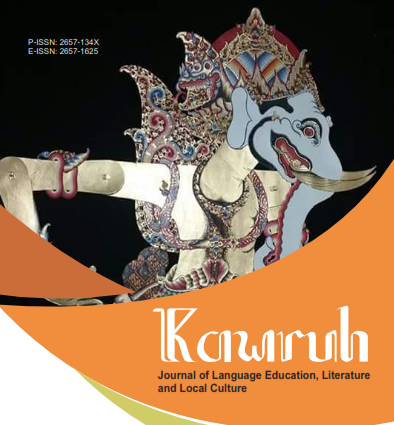Kaprawiran Character in Serat Wira Wiyata and Its Suitability in Learning Javanese Language
DOI:
https://doi.org/10.32585/kawruh.v7i1.6513Abstract
This research is based on the study of Javanese manuscripts. This research contains two objectives. The first objective of this study is to explain the character values in Serat Wira Wiyata. The second objective of this research is to describe the suitability of character values in Serat Wira Wiyata in Javanese language learning at the Vocational School level. The results of this study explain two things. The first is the character values in Serat Wira Wiyata. The character values found in Serat Wira Wiyata are religiosity, discipline, hard work creativity, responsibility, and affection. Three-character values are characteristic of Serat Wira Wiyata, namely the character values of being wise, obedient, and brave. The result of the second study is to explain the suitability of the character values in the Serat Wira Wiyata for learning Javanese. Based on the results of the adjustments to the 2013 curriculum, these character values are still appropriate to be applied in learning Javanese at the Vocational School level.
Downloads
References
Ahmad, A., & Aljufri, S. (2019). Pendidikan Islam Membentuk Nilai dan Karakter Peserta Didik. Guru Tua: Jurnal Pendidikan dan Pembelajaran, 2(1), 1-8.
Alwi, Muhammad Azdahar. (2017). Kejadian Kekerasan Remaja di Kalangan Siswa/Siswi SMK Muhammadiyah 5 Jakarta. Jakarta: UIN Syarif Hidayatullah.
Arafik, Muh., Rumidjan. (2016). Profil Pembelajaran Unggah-ungguh Bahasa Jawa di Sekolah Dasar. Sekolah Dasar, 25(1), 55-61. http://journal2.um.ac.id/index.php/sd/article/view/1313/679
Bahri, Saiful. (2015). Implementasi Pendidikan Karakter dalam Mengatasi Krisis Moral di Sekolah. Ta’allum: Jurnal Pendidikan Islam, 3(1), 57-76. https://doi.org/10.21274/taalum.2015.3.1.57-76
Baried, S. B. (1985). Pengantar Teori Filologi. Jakarta: Pusat Penelitian Bahasa Departemen Pendidikan dan Kebudayaan.
Dwijanagara, S. dkk. (2019). Pendidikan Karakter dalam Lakon Banjaran Bima dan Implikasinya dalam Pendidikan. Jurnal Pendidikan Karakter, 10(2), 133-151. https://doi.org/10.21831/jpk.v9i2.24981
Ekowati, Venny Indria, dkk. (2017). Pendidikan Karakter dalam Iluminasi Naskah Babad Pecinan. Jurnal Penelitian Humaniora. 22(1), 32-45. https://doi.org/10.21831/hum.v22i1.19101
Elfindri. (2012). Pendidikan Karakter: Kerangka, Metode, Dan Aplikasi Untuk Pendidikan dan Professional. Jakarta: Baduose Media.
Fransiska, Windy. (2021). Kajian Nilai dan Makna Kearifan Lokal Reog Ponorogo dan Relevansinya terhadap Pembentukan Karakter Bangsa. PENSA: Jurnal Pendidikan dan Ilmu Sosial, 3(3), 371-377 https://ejournal.stitpn.ac.id/index.php/pensa
Harmianto, Sri & Muslim. (2015). Peningkatan Minat dan Prestasi Belajar Mahasiswa PGSD Pada Mata Kuliah Media Pembelajaran PKn. Prosiding Pengembangan Sumber Daya Menuju Masyarakat Madani Berkearifan Lokal, Universitas Muhammadiyah Purwokerto: Desember 2015, ISBN 978-802-14930-3-8.
Kaelan. (2005). Metode Penelitian Kualitatif Bidang Filsafat. Yogyakarta: Paradigma.
Kurdaningsih, Dian Marhaeni & Iky Putri Aristhya. (2022). Prinsip Anti “Emban Cinde Emban Siladan” Pendampingan Komunikasi Keluarga Sebagai Implemntasi Pendidikan Orang Tua pada Remaja dalam Berperilaku Adil. Jurnal Ilmiah Pengabdian Kepada Masyarakat (PAKEM), 4(2), 94-105. http://jurnal.stietotalwin.ac.id/index.php/pakem/article/view/409
Kurniawan, Syamsul. (2013). Pendidikan Karakter: Konsepsi & Implementasinya Secara Terpadu di Lingkungan Keluarga, Sekolah, Perguruan Tinggi, & Masyarakat. Yogyakarta: Ar-Ruzz.
Muhamadi, S., & Hasanah, A. (2019). Penguatan pendidikan karakter peduli sesama melalui kegiatan ekstrakurikuler relawan. Jurnal Pendidikan Agama Islam, 16(1), 95-114. https://doi.org/10.14421/jpai.2019.161-06
Musman, Asti. (2017). Pitutur Luhur Jawa Ajaran Hidup dalam Serat Jawa. Yogyakarta: Pustaka Jawi.
Ningrum, R. W., Ismaya, E. A., & Fajrie, N. (2020). Faktor–Faktor Pembentuk Karakter Disiplin dan Tanggung Jawab Dalam Ekstrakurikuler Pramuka. Jurnal Prakarsa Paedagogia, 3(1). https://doi.org/10.24176/jpp.v2i1.4310
Nurhayati, E. (2010). Nilai-Nilai Moral Islami dalam Serat Wulang Reh. Millah: Journal of Religious Studies, 10(1), 41–56. https://doi.org/10.20885/millah.vol10.iss1.art3
Nursisto. (2002). Peningkatan Prestasi Sekolah Menengah Acuan Siswa, Pendidikan dan Orang Tua. Jakarta: Insan Cendikia
Sudrajat, Ajat. (2011). Mengapa Pendidikan Karakter. Jurnal Pendidikan Karakter, 1(1), 47-58. https://doi.org/10.21831/jpk.v1i1.1316
Sugiyono. (2011). Metode Penelitian Kuantitatif, Kualitatif dan R & D. Bandung: Alfabeta.
Suleman, Dede. (2020). Disiplin: Sikap dan Perilaku Taat. Scientific Journal of Reflection, 3(1), 11-21. https://doi.org/10.37481/sjr.v3i1.111
Susilawati, S., Aprilianti, D., & Asbari, M. (2022). The Role of Islamic Religious Education in Forming the Religious Character of Students. Journal of Information Systems and Management (JISMA), 1(1), 1–5. https://doi.org/10.4444/jisma.v1i1.1
Purnamawati, Dyah Hanggraheni & Sri Harti Widyastuti. (2019). The Values of Leadership in the Puppet Show: Bisma Gugur by Ki Manteb Soedarsono. 1st International Conference on Language, Literature, and Arts Education (ICLLAE 2019), Vol. 461,390-393 http://creativecommons.org/licenses/by-nc/4.0/
Purwanto, Yedi. (2014). Memakai Pesan Spiritual Ajaran Agama dalam Membangun Karakter Kesalehan Sosial. Jurnal Sosioteknologi, 13(1). 41-46. http://dx.doi.org/10.5614/sostek.itbj.2014.13.1.5
Zaini, M. (2018). Pendidikan remaja dalam perspektif psikologi pendidikan. EL-BANAT: Jurnal Pemikiran Dan Pendidikan Islam, 8(1), 99-117.
Downloads
Published
How to Cite
Issue
Section
License
Copyright (c) 2025 Azis Heru, Endang Nurhayati, Venny Indria Ekowati

This work is licensed under a Creative Commons Attribution-ShareAlike 4.0 International License.
Authors who publish with the Kawruh: Journal of Language Education, Literature and Local Culture agree to the following terms:
- Authors retain copyright and grant the journal the right of first publication with the work simultaneously licensed under a Creative Commons Attribution License (CC BY-SA 4.0) that allows others to share the work with an acknowledgment of the work's authorship and initial publication in this journal.
- Authors are able to enter into separate, additional contractual arrangements for the non-exclusive distribution of the journal's published version of the work (e.g., post it to an institutional repository or publish it in a book), with an acknowledgment of its initial publication in this journal.
- Authors are permitted and encouraged to post their work online (e.g., in institutional repositories or on their website) prior to and during the submission process, as it can lead to productive exchanges, as well as earlier and greater citation of published work.

